

Women's Technology Program in ME. Welcome to the Women's Technology Program in Mechanical Engineering!

The WTP in ME is a four-week residential summer program in the MIT Dept. of Mechanical Engineering to introduce high school girls to the basic principles and ideas of mechanical engineering in the summer after 11th grade. It was created in the summer of 2006 and modeled after the WTP in EECS. Classes taught by female graduate students in the MIT ME department provide an in-depth study of many of the subject areas used by mechanical engineers, such as fluid mechanics, materials, statics, heat transfer, thermodynamics, and engineering design.
Summer Programs at Johns Hopkins. Now accepting applicaitons for all 2015 sessions.
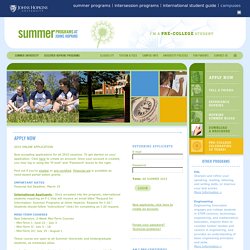
To get started on your application: Click here to create an account. Once your account is created, you may log in using the "E-mail" and "Password" boxes to the right. Pre-Collegiate Summer Institutes. Pre-College Program. June 30, 2015 - August 8, 2015 The Pre-College Program is designed for rising juniors and seniors interested in the intellectual challenge and rigorous pace of a true undergraduate experience.
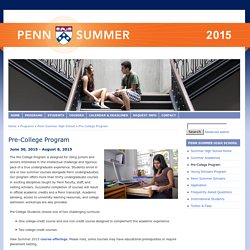
Students enroll in one or two summer courses alongside Penn undergraduates. Our program offers more than thirty undergraduate courses in exciting disciplines taught by Penn faculty, staff, and visiting scholars. Successful completion of courses will result in official academic credits and a Penn transcript. Academic advising, access to university learning resources, and college admission workshops are also provided. Pre-College Students choose one of two challenging curricula: One college-credit course and one non-credit course designed to complement the academic experienceTwo college-credit courses View Summer 2015 course offerings.
How to Apply College Credit Courses Students earn one course unit (1 CU, or the equivalent of 3-4 college credit hours) for each course taken. Enrichment Classes. Experimental Physics Research Academy. Taught by members of Penn’s Department of Physics and Astronomy and regional physics teachers, this program combines in-depth lectures andiscussions on mechanics, electromagnetism, quantum dynamics, and astrophysics with hands-on experiments to measure the speed of light and a field trip to an amusement park to study the physics of rides using electronic data-logging devices.
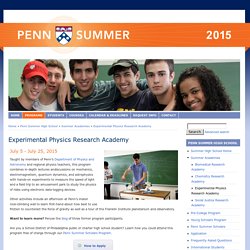
Other activities include an afternoon at Penn’s indoor rock-climbing wall to learn first-hand about how best to use friction to counteract the force of gravity as well as a tour of the Franklin Institute planetarium and observatory. Want to learn more? Peruse the blog of three former program participants. Are you a School District of Philadelphia public or charter high school student? Learn how you could attend this program free of charge through our Penn Summer Scholars Program.
Admissions. Biomedical Research Academy. Taught by members of Penn's Department of Biology and regional biology teachers, the goal of this program is to introduce students to the experimental basis of biology, including relevance to disease.
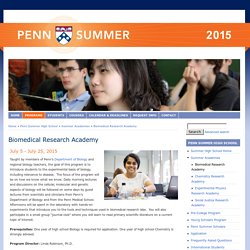
The focus of the program will be on how we know what we know. Daily morning lectures and discussions on the cellular, molecular and genetic aspects of biology will be followed on some days by guest lectures from scientists and clinicians from Penn’s Department of Biology and from the Penn Medical School. Afternoons will be spent in the laboratory with hands-on experiments that introduce you to the tools and techniques used in biomedical research labs. You will also participate in a small group “journal club” where you will learn to read primary scientific literature on a current topic of interest. Prerequisites: One year of high school Biology is required for application. Program Director: Linda Robinson, Ph.D. Dr. Biomedical Engineering: The Smart Design of Medical Implants and Devices. One Section Available to Choose From: Course Description Are you passionate about innovative approaches to improving human health?
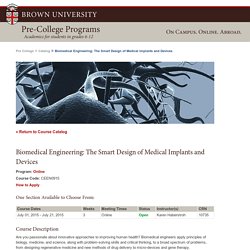
Biomedical engineers apply principles of biology, medicine, and science, along with problem-solving skills and critical thinking, to a broad spectrum of problems, from designing regenerative medicine and new methods of drug delivery to micro-devices and gene therapy. In this course, you will explore how the field of biomedical engineering applies math and science fundamentals to the development of replacement tissues, organs, and devices. You will: "This class was very helpful in providing a 'taste' of a rising scientific field, and guiding students to future career paths. Learn more about your instructor for this course. Course Requirements: Time commitment: To be successful in this course, you must have reliable internet access, and will be expected to participate multiple times each week. Pre-College Program.